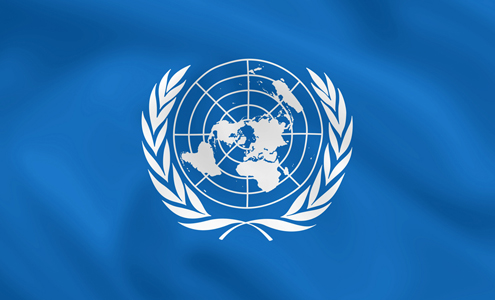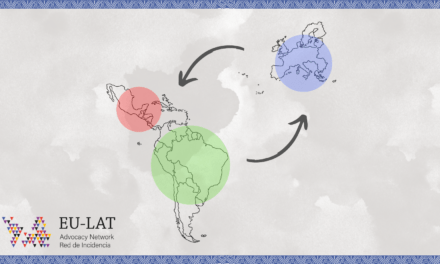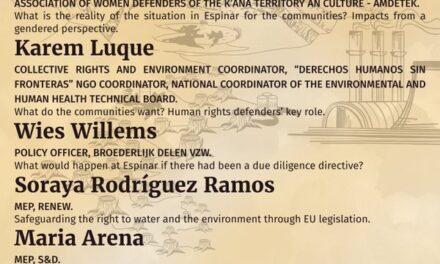Last November, more than 60 civil society organizations signed an Open Letter addressed to the European Commission asking that the future draft on due diligence have a gender focus. However, the proposal that was forwarded to Parliament and the Council lacks specific tools in this regard. The European Union has expressed on many occasions its commitment to a gender approach in its foreign action and for this reason, we want to insist on the need for the European institutions to respond in the legislative text to the challenges that this reality requires.
Brussels, 31st of March, 2022.
Subject: Ensuring a gender-responsive and effective Corporate Sustainability Due Diligence legislation
Dear President of the European Commission Ursula von der Leyen,
Dear Vice-President Vera Jourová,
Dear Commissioner Thierry Breton,
Dear Commissioner Helena Dalli,
Dear Commissioner Didier Reynders,
Dear Members of Parliament,
Dear Council of the European Union Representatives,
On March 8th, we celebrated International Women’s Day and paid tribute to the women who defend human rights and the environment across the world – women who are at the forefront of the fight against discrimination and inequality, and work towards protecting environmental, land and Indigenous peoples’ rights in the context of business activities. We also highlighted the violence and discrimination that they face in the workforce as a result of their gender.
The Corporate Sustainability Due Diligence Directive proposal adopted by the European Commission on February 23rd lays down rules for companies to respect human rights and the environment in global value chains. We, the undersigned organizations, welcome this long-awaited proposal and strongly believe that it is high time for companies to respect human rights and the environment, and be held accountable for their actions and impacts.
However, despite its groundbreaking potential, the Commission’s proposal is gender-blind and risks leaving women and girls behind.
The current text does not recognize the fact that business and human rights abuses have differentiated impacts on individuals and groups in marginalized situations, including on women and girls. This comes as a great disappointment when over 60 organisations wrote to the European Commission in November 2021, urging them to ensure that the upcoming proposal be gender-responsive and strongly aligned with the EU Gender Equality Strategy and the Gender Action Plan III.
Gender-specific impacts on women happen in all sectors, from extractives, manufacturing and agriculture to accommodation, food services industry and the garment sector. Such issues frequently intersect with other grounds for discrimination many women are further discriminated against based on intersecting identities such as their ethnic origin, age, class, caste, migration status, gender identity and/or other factors.
This is why gender-responsive due diligence rules and corporate accountability are urgently needed to properly address these deep-seated inequalities.
Gender-responsiveness must be included in all steps of the due diligence process; if not, it will render invisible the specific risks and additional barriers faced by women and/or groups in vulnerable situations.
Furthermore, not addressing the obstacles in access to justice will continue tying the hands of affected women and girls to be able to defend themselves and demand remedy.
As the proposal makes its way through the European Parliament and the Council of the European Union, we call on policy-makers to bring the following improvements to the proposal to ensure it is gender-responsive:
- In line with the UNGPs and the OECD guidelines, the Directive should recognise that companies need to pay special attention in their due diligence to the actual and potential adverse impacts on groups or populations that may have a heightened risk of vulnerability or marginalisation. Companies should also take into account the different risks that may be faced by women and men, as women and people with gender-diverse identities face gender-specific impacts;
- The list of rights and prohibitions and conventions used to define “adverse human rights impacts” in the Annex is too limited, particularly to prevent and remedy corporate women’s rights abuses. It must be made clear that this Annex is non-exhaustive. In addition the list should be expanded to include additional violations and prohibitions in Part I and other key conventions should also be added in Part II;
- The company scope must be broadened so that all companies have an obligation to respect human rights and the environment. Furthermore, all companies under the scope must identify all adverse impacts. The current distinction where a group of companies active in high-impact sectors is allowed to limit identification to “severe adverse impacts”, instead of all their impacts is not justified. It contradicts international standards and is counter-intuitive as high-impact sectors are those where the risk of adverse impacts is the highest, where women are most present and thus where the need for intervention is the most crucial;
The due diligence obligation, as described throughout the proposal, must be amended on several aspects to ensure that it is gender-responsive in every step, notably:
- The due diligence obligation must cover the whole value chain. The term “established business relationship” risks limiting the coverage of the obligation to the closest, only formal or lasting suppliers. Such limitation risks leaving out entire layers of activities, including semi-formal and informal working schemes as well as unofficial subcontracting and home-based work, in which women are disproportionately represented;
- Companies must be required to safely and meaningfully engage with stakeholders, and in particular with vulnerable and marginalised individuals, communities and their representatives throughout each step of due diligence. Stakeholder engagement and complaints mechanisms must be gender-responsive. Furthermore, the protection of whistleblowers (article 23) should be expanded to protecting all Human Rights Defenders in particular when based outside the EU where their vulnerability is particularly heightened;
- Identification of risks as well as monitoring of operations and measures must include gender-sensitive human rights and environmental impact assessments and indicators, including by gathering and using disaggregated data (based on sex, ethnicity, age, migration status and others). Companies must also be required to map and disclose their value chain and business relationships;
- To ensure that the objectives of the proposed directive are achieved, the described due diligence obligation must go beyond procedural provisions. The text must clearly state that companies have an obligation to respect human rights and the environment and this must be reflected in Article 1 on the purpose of the Directive and on Article 4 on Due Diligence, independent from the additional procedural requirements laid down in the proposal. It must also require companies to carry out detailed and qualitative assessment and evaluation of the measures taken to prevent and minimise actual and potential adverse impact, giving specific attention to women and girls and other marginalised groups, and do so through safe and meaningful consultation with stakeholders;
- Specify that the impact of purchasing practices and business models must be an integral part of a company’s due diligence policies and activities. Unfair purchasing practices on cost and schedules have a direct and disproportionate impact on women (low wages and incomes, unsafe conditions, abusive subcontracting);
- Include the explicit obligation for companies to remediate harm, as well as provisions for victims to access both non-judicial and judicial remedies. Available remedies must go beyond financial compensation (article 8.3.(a)), they must take into account the needs and interests of the affected party and be decided and designed in consultation with rightholders. Due attention shall be given to overcome the barriers that women, and other marginalised groups face in accessing and securing remedy, as well as in ensuring that all procedures are impartial, safe and free from undue influence;
- Include provisions to facilitate access to justice by ensuring a fair distribution of the burden of proof, reducing time limitations, allowing for collective redress and representative actions.
The Corporate Sustainability Due Diligence Directive proposal represents a unique opportunity to fight gender inequality and discrimination in global value chains. We call on you to take that step and change the text to ensure that the proposal fulfills its promise and its potential.
Sincerely,
Signatories:
- ActionAid International
- AK EUROPA
- Amigas de la Tierra (Spain)
- Anti-Slavery International
- Arisa
- ASTM
- Asociación de investigación y Especialización sobre Temas Iberoamericanos
- Asociación por la Paz y los Derechos Humanos Taula per Mèxic
- Avocats Sans Frontières
- Broederlijk Delen
- Brot für die Welt
- Business & Human Rights Resource Centre
- Cambodian Center for Human Rights (CCHR)
- Campagna Abiti Puliti
- CARE International
- CNCD-11.11.11
- Christian Aid Ireland
- Christian Initiative Romero
- CIDSE
- Clean Clothes Campaign
- CooperAcció
- CorA-Netzwerk für Unternehmensverantwortung
- Corporate Justice Coalition
- cum ratione gGmbH
- Development Projects for Women – Marie-Schlei-Verein
- Diakonia
- Entraide et Fraternité
- Entrepueblos
- European Trade Union Confederation (ETUC)
- European Coalition for Corporate Justice – ECCJ
- EU-LAT Network
- European Center for Constitutional and Human Rights (ECCHR)
- EZA Fairer Handel GmbH
- Fair Finance International
- Fair Trade Advocacy Office
- Fairtrade International
- FAIRTRADE Österreich
- FEMNET e.V.
- FIAN Germany
- Focus Association for Sustainable Development
- FOKUS – Forum for Women and Development
- Forum Fairer Handel
- Friends of the Earth Europe
- Foro Ciudadano de Participación por la Justicia y los Derechos Humanos FOCO.INPADE Argentina
- ForumCiv
- Fundacion Alboan
- Global Policy Forum
- Global Witness
- Grupo belga Solidair met Guatemala
- Human Rights Without Frontiers
- International Dalit Solidarity Network
- IM Swedish development partner
- INKOTA-Netzwerk
- International Federation for Human Rights (FIDH)
- International Justice Mission Germany
- International Service for Human Rights
- Irish Coalition for Business and Human Rights
- Jamaa Resource Initiatives, Kenya
- KOLPING International
- Lady Lawyer Foundation
- Les Amis de la Terre – Belgique
- Manushya Foundation, Thailand
- Milieudefensie – Friends of the Earth Netherlands
- Oxfam International
- PICUM (Platform for International Cooperation on Undocumented Migrants)
- Project Organising Development Education and Research (PODER)
- Protection International (PI)
- Rainforest Alliance
- Red europea de comité Oscar Romero
- ShareAction
- Centre for Research on Multinational Corporations – SOMO
- Stichting IUCN Nederlands Comité
- Südwind (Austria)
- Swedish Fellowship Of Reconciliation
- Swedwatch
- TERRE DES FEMMES e.V.
- Trócaire
- We Effect
- Women Engage for a Common Future – WECF International
- Women’s International League for Peace and Freedom
- Workers Assistance Center,Inc., Philippines
- World Organisation Against Torture (OMCT)
- WSM




